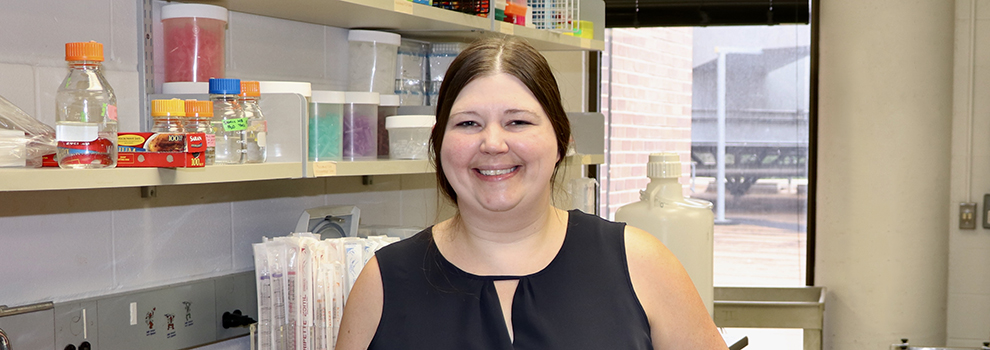Weber: Understanding and developing strategies against chlamydial infection

Chlamydia trachomatis is the most common sexually transmitted bacterium in the world. But left untreated, it can lead to pelvic inflammatory disease, increased risk for cancer, or trachoma—the leading cause of infectious blindness worldwide.
The global and long-term impact of this microorganism on human health is what motivates researcher Mary Weber, PhD, assistant professor of microbiology and immunology in the University of Iowa Carver College of Medicine.
“Being able to see people get treated and not develop some of these severe consequences that can come from chlamydial infection is really important,” Weber says. “Overall, my goal is to minimize those lifelong complications.”
A chlamydia microorganism is unique in that it has a similar life cycle to a virus, meaning it cannot replicate outside of a human host cell.
“So that might be its Achilles’ heel,” Weber says. “If we can block its ability to recognize a host cell and get taken up into a cell, it’s not going to be able to proliferate and cause disease. The same thing applies later on in the infection cycle—if the microorganism does get in, is it possible for us to block its interactions with the host cell or create a hostile environment for it?”
Weber’s lab recently received two major grants from the National Institutes of Health to support this research. One of the grants is dedicated to the lab’s research into understanding the initial events of chlamydial infection, when the microorganism is taken up into a host cell; the other supports the lab’s study of how to starve the bacterium of nutrients once it is in the host cell, to block further interactions.
These grants will also hopefully allow the lab to develop new research projects.
“It’s really a dream come true to be able to pursue these things that you’re interested in,” Weber says. “To be able to come up with those ideas and to have other people recognize that the questions you’re asking are important is just wonderful.”
She is especially passionate about studying chlamydial infection because of the risks it poses to women’s health. Chlamydia often goes untreated in women because many cases are asymptomatic so individuals do not seek treatment, which can result in pelvic inflammatory disease, pregnancy issues, or cervical and ovarian cancer.
Weber hopes that understanding how chlamydial bacteria interact with a human host can better inform therapeutics that will prevent infection of Chlamydia trachomatis whether in the form of prophylactic treatments to prevent chlamydia in people who engaged in unprotected sex, or treatments to prevent trachoma in developing nations where it’s a major cause of blindness.
“If we can determine what the bacterium produces and interacts with to get inside the cell, it may be possible to come up with some kind of chemical analogue or something that we can use that may be a better treatment,” she says. “Identifying novel therapeutic treatments to block bacterial entry is the long-term goal.”